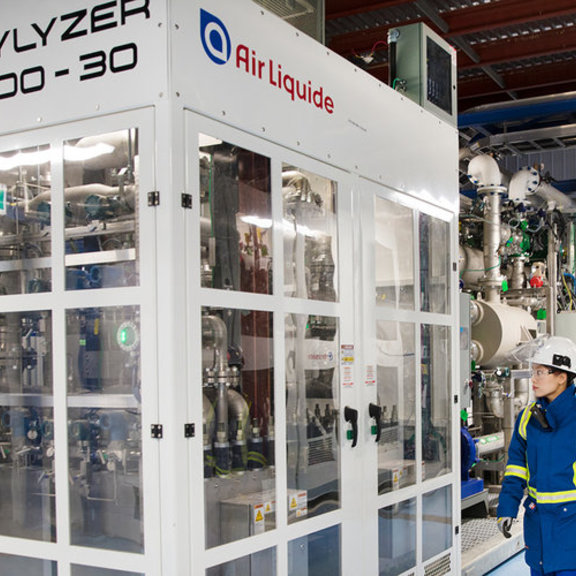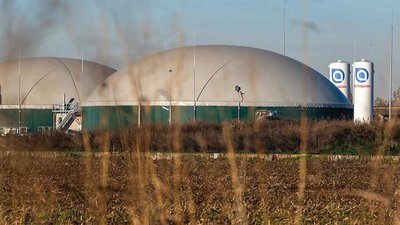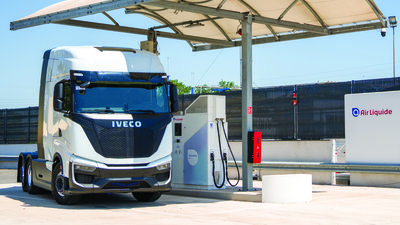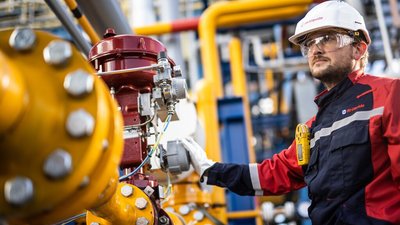Hydrogen and biomethane, the mobility revolution
Published on August 19, 2021
7 minutes

Hydrogen has a key role to play in the energy mix of the future and is, along with biomethane, at the heart of the clean transport revolution. Air Liquide is committed to the energy transition and is currently strengthening its lead in these growth markets by developing large-scale projects and strategic partnerships.
The health crisis has acted as a trigger. Faced with the climate emergency, it is time to switch from awareness raising to action. The importance given to the energy transition in the economic recovery plans of several countries underlines this shift. And in particular the interest in hydrogen in response to transportation challenges (16% of global GHG emissions1 ). Countries such as China, Japan and the United States, already launched ambitious policies several years ago to increase the number of hydrogen-powered vehicles and have invested accordingly. In Europe, the Clean Hydrogen Alliance, founded by the European Commission, is promoting this energy carrier to reach carbon neutrality by 20502 . The EU has a dedicated strategy to become a global hydrogen player by the end of the decade. Some of its Member States have allocated budgets in the order of several billion euros to develop the sector, such as France, which will invest 7. 2 billion euros by 2030. “The large investments that have been put on the table will facilitate a shift in scale and help reinvent new growth models. We have reached the dawn of a systemic change in which hydrogen and biomethane will play a key role, in particular in terms of transport, to limit our dependency on oil,” explains Erwin Penfornis, Vice President of the Hydrogen Energy world business unit at Air Liquide. This represents major opportunities for the Group which, for several years, has been driving an active growth strategy based on hydrogen energy and the valorization of biogas in biomethane.
The scaling up of hydrogen
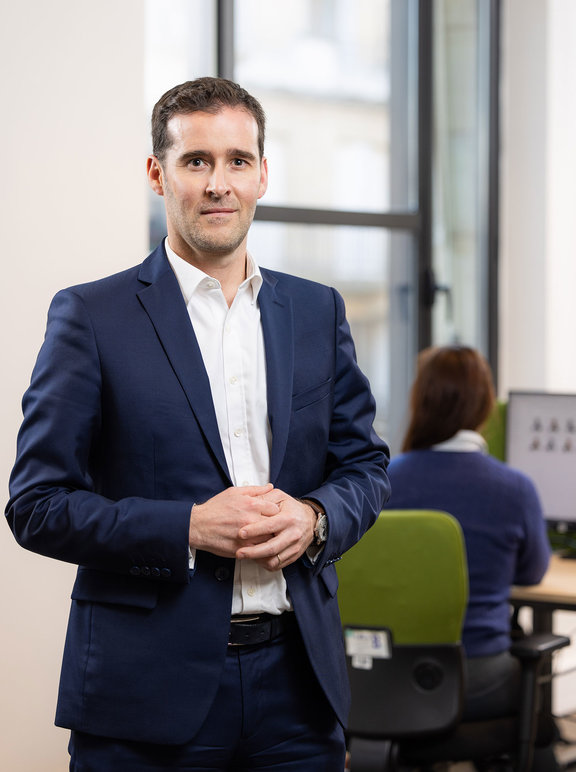
“Hydrogen is one of the key solutions for a successful energy transition. This element will help us meet the clean transport challenge and thus contribute to improving air quality.
”
Erwin Penfornis
Vice President of the Hydrogen Energy world business unit at Air Liquide
Over the past 50 years, Air Liquide has developed unique knowhow in the management of the entire hydrogen value chain (production, storage, distribution and the development of new usages). This molecule can now be produced using renewable energy sources, stored long term and then re-transformed into electricity, thus compensating for the intermittent nature of these same energy sources. The Group firmly believes that hydrogen is a key driver to make the switch to a low- carbon society. Thanks to this molecule, hydrogen-powered cars, buses, trucks, trains and even boats are not only quiet but do not generate CO2 emissions or other pollutants when running.
Since 2020, the Group has stepped up its investment to promote hydrogen mobility.
"In Canada , we have commissioned the world’s largest membrane-based electrolyzer for the production of low-carbon hydrogen for the North American mobility market in particular,” adds Erwin Penfornis. “In France, we recently announced the acquisition by Air Liquide of a stake in the capital of H2V Normandy3 with a view to build an electrolyzer complex for the large scale production of renewable and low-carbon hydrogen. This is an ambitious project to contribute to the decarbonization of the local industry and mobility markets.”
In addition to these strategic investments aimed at increasing low-carbon hydrogen production capacity, the Group is also working on scaling up the distribution networks.
As well as the roll-out of stations for light vehicles in Europe, Japan, South Korea and the United States, Air Liquide is also focused on the truck segment. Large-scale projects are becoming a reality: in Rotterdam in the Netherlands and Fos-sur-Mer in France for example, where the Group is part of key initiatives to develop large-capacity hydrogen stations which will be used to power long-distance trucks.
The diversity of these investments underlines the industrial momentum driven by the Group. “We are striving to unite all players likely to have a major impact on this transformation: industrial players, states and global institutions,” explains Erwin Penfornis. Air Liquide has founded several initiatives worldwide, such as the Hydrogen Council which brings together more than 100 executive officers of large international companies. The Group is also forming public-private partnerships, such as in California and South Korea, to develop hydrogen mobility. In France, it is part of the new National Hydrogen Council which is co-chaired by Benoît Potier, the Chairman and CEO of Air Liquide, and Patrick Koller, the Chief Executive Officer of Faurecia4. Its purpose: to structure and develop the French industrial hydrogen segment. “These partnerships are fundamental in promoting collaborative solutions capable of scaling up production and distribution capacities, and thus making hydrogen a global reality,” concludes Erwin Penfornis.
Convinced that hydrogen will be one of the drivers of the energy transition, leaders from the energy, transport and industrial sectors, along with Air Liquide, decided to join forces in 2017. Their objective: promoting a long-term vision of hydrogen technologies and usage, and accelerating its large-scale deployment. Three years down the line, the Hydrogen Council, co-chaired by Benoît Potier, Chairman and CEO of Air Liquide and Takeshi Uchiyamada, Chairman of Toyota Motor Corporation, includes executives from more than 100 large international corporations which represent the entire hydrogen value chain and investment companies.
Biomethane: a circular economy asset
Alongside hydrogen, biomethane is well placed in the transportation revolution. It decreases travel related CO2 emissions by 85%, particles by 90% and noise by a potential 50% compared to diesel engines. The Group is investing across the entire value chain of this green energy source, from the recovery and purification of biogas right through to distribution to the end customer in Bio-NGV stations (natural gas for vehicles). The major advantage of this energy source: its natural position in a circular economy where biomass, transformed into biomethane, participates in the optimization of natural resources.
- Christiane Muller
Vice President of the Global Markets &Technologies activity at Air Liquide
In this context, customers can be both the generators of biomethane from the biomass that they produce, as well as the consumers of the energy thus obtained. "In this market of the future, we are already very active, with 20 biomethane production units worldwide and around 90 Bio-NGV stations in Europe," says Christiane Muller, Vice President of the Global Markets & Technologies activity at Air Liquide. Leading UK retailer ASDA has entrusted Air Liquide with the installation and operation of six biomethane distribution stations to refuel trucks at its sites. In Italy, the Group has just launched this activity with the construction of two production units near Milan, and also intends to build a biomethane filling station for transporters in the region. These investments underline the significant change of pace in the development of the Group’s biomethane activities in Europe.
Air Liquide, through its various innovations and achievements, is playing a leading role in making hydrogen and biomethane key solutions for clean mobility. The change in scale is clearly visible.
Air Liquide manages the entire hydrogen supply chain from production to storage, distribution and the development of applications for end users. Through its expertise, the Group is driving the widespread use of hydrogen as a source of clean energy, especially for mobility.
To support the energy transition, the Global Markets & Technologies (GM&T) activity brings environmentally friendly solutions to the clean energy market such as hydrogen energy and biomethane, in particular for clean mobility and industrial use.
2. Objective stated by the European Commission in November 2018 in its “A clean planet for all” strategy.
3. Subsidiary of H2V Product Group, industrial company producing carbon-free hydrogen, based on water electrolysis using renewable energy.
4. French global automotive supplier.
